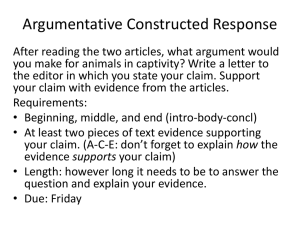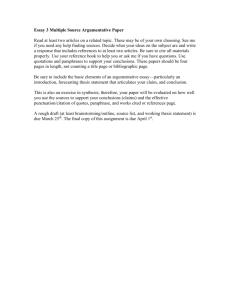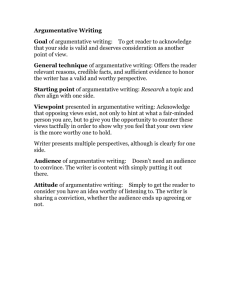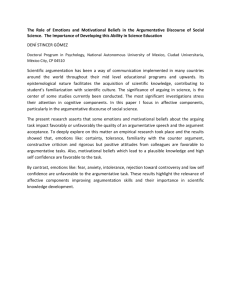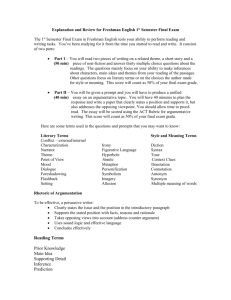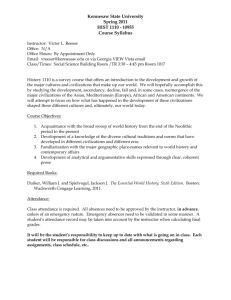Argumentative Writing
advertisement
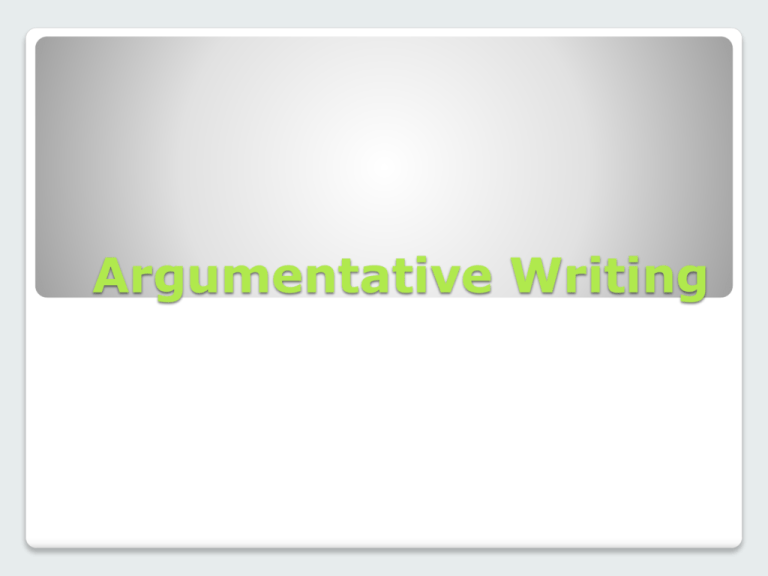
Argumentative Writing Argumentative Writing Think, pair, share… When do you persuade people of things? When people persuade you, what makes their argument so convincing? Argumentative Writing You encounter persuasive arguments every day: TV Commercials Billboards Junk mail Magazine Public service announcements Brochures …? ads Argumentative Writing What is argumentative writing? Argumentative writing attempts to persuade someone of something by writing a convincing argument Argumentative Writing – DUE FRIDAY 1/15, Plan due Friday 1/8 Natural Disaster Readiness You will be writing a persuasive letter of argument to convince a real-life, official agency to create a more effective natural disaster readiness plan. You will actually send this letter – either in the mail or through email. -To whom will you be writing this letter? (Be specific) -What kind of natural disaster will you be addressing? (Earthquake, tornado, snowstorm, etc.) -What specific readiness methods are you asking them to put into action? (E.g., ____?) Argumentative Writing (DUE FRIDAY 1/15) Write an authentic letter of persuasion to a real life person convincing them of what you want to happen. You will actually send this letter and prove to me that you sent it – either in the mail or through email. You will be graded on… Elaboration Use of argumentative techniques Acknowledging the audience’s counter arguments Minimum: 1 page Argumentative Writing – DUE FRIDAY 1/15 Write an authentic letter of persuasion to a real life person convincing them of what you want to happen. You will actually send this letter – either in the mail or through email. There are so many ideas! Here are just a few… A letter to the principal or school board about a rule or policy A letter to the city about fixing a pothole or building a new skate park A letter to your state’s legislature asking representatives to consider an idea you have for a new law/policy A letter to a band or musician convincing them to come to your city on their next tour A letter to an advertising firm asking them to change their campaign (Insensitive? Appropriative? Sexist? Etc.) A letter to your local waste management company convincing them to provide a composting option A letter to a company about their practices (Animal testing? Non eco-friendly procedures?) A letter to a brand name to invent a new product or bring a certain product back A letter to your neighborhood grocery store to start carrying this item or that item A letter to one of your neighbors A letter of complaint to a restaurant or company (this one could earn you some $$ or discounts) A plan for your own defense in traffic court A “open letter” ….????????? Argumentative Writing Descriptions and anecdotes Paint your topic with plenty of detail Use anecdotes (short, personal stories) when appropriate Descriptions – involve the reader’s 5 senses Argumentative Writing Quotes and statistics Use statistics and reputable studies Cite experts on the topic with quotes Argumentative Writing Quotes Use quotes! But don’t misrepresent a quote or leave out important information. Misquote: “Crime rates were down by 2002,” according to Dr. Smith. Actual quote: “Crime rates were down by 2002, but steadily began climbing again a year later,” said Dr. Smith. Argumentative Writing Ethos, Pathos and Logos – Ideas by Aristotle Appeal to your audience’s hearts as well as their minds. Logos: Using logic to be convincing Pathos: Getting an audience to feel emotions about a topic Ethos: The ethics (morally right or wrong) in an issue AND to trust you as a trustworthy expert on the topic Watch this video! https://www.youtube.com/watch?v=O2dEuMFR8kw Argumentative Writing Pop Quiz! This quiz will be OPEN NOTES and a GROUP GRADE. Your job right now is to make sure everybody gets it! Study what we’ve learned so far! What argumentative writing is The 4 types of detail ◦ ◦ ◦ ◦ Anecdote Description Stats Quotes Ethos, pathos, logos Argumentative Writing Pop Quiz! This quiz will be OPEN NOTES and a GROUP GRADE. What 2. What 3. What 4. What 1. is is is is argumentative writing? an anecdote? logos? pathos? Argumentative Writing The 6 Principles of Persuasion Watch this video: https://www.youtube.com/watch?v=cFdCzN7 RYbw Take notes on what these 6 principles mean. Be ready to define them after the video: 1. 2. 3. 4. 5. 6. Reciprocity Scarcity Authority Consistency Liking Consensus Argumentative Writing The 6 Principles of Persuasion 1. Reciprocity People are much more likely to give back if they have received something first “Be the first to give; make sure it’s” personalized and unexpected Give one, get one 2. Scarcity “People want things more” when they know less is available Limited editions sell better Argumentative Writing The 6 Principles of Persuasion 3. Authority “People will follow knowledgeable, credible experts” 4. Consistency “Asking for commitments that can be made” A small commitment now may lead to a big one later on Argumentative Writing The 6 Principles of Persuasion 5. Liking We are much more likely to be convinced by people who are “similar to us, who compliment us, and who cooperate with us” 6. Consensus “People will look to the actions of others to determine their own actions” Everybody else is doing it Argumentative Writing Know your audience! Why do I need to “know my audience” that I’m trying to persuade? You are trying to persuade people that don’t already agree with you. Argumentative Writing Be kind to your audience Be careful not to use offensive words (“stupid,” etc.) Don’t lecture or talk down to your audience Don’t make threats or “bully” your reader Don’t employ guilt trips Be careful of using the second person, “you” Argumentative Writing Find common ground with your audience, i.e., things you can agree with For example: You might try to persuade Mr. Parker to put an emergency kit in each classroom in case of an earthquake. Common ground: Both you and Mr. Parker care about the safety and well- being of our students. Argumentative Writing Find common ground with your audience. For example: You might support a war, whereas your audience might not. Common ground: Both sides want to see their troops come home. Note to Pre-AP students: This is also called “Rogerian Argumentation” Argumentative Writing Refute counterarguments (sometimes called a “concession rebuttal”) For example: Your Argument: We need an emergency kit in every classroom in case of an earthquake The Opposition: Earthquake kits will be too expensive. Refute: $9,672 is already allocated to each student’s education per year. What is just $20 more? Our students are our future, and their lives are worth it. Argumentative Writing Refute counterarguments (sometimes called a “concession rebuttal”) For example: Your Argument: Organic produce from local Farmers’ Markets is better than store-bought produce. The Opposition: Organic produce is too expensive. Refute: Cancer-causing pesticides will cost us more in the long run. Argumentative Writing Avoid using “absolutes” An absolute is when you say something is ALL one way or ALL another Using words like “always,” “never” How could you fix the following sentences? ◦ If a girl wears a short skirt, the boys around her will get distracted and neglect their schoolwork ◦ Gang-related colors cause violence whenever they are worn in class, so they should be banned Argumentative Writing • Absolutes Argumentative • Common ground writing terms we • Counter know now! argument • Reciprocity Anecdotes • Scarcity Descriptions • Authority Statistics • Consistency Quotes • Liking Ethos • Consensus Pathos • Fallacy Logos Argumentative Writing Convincing Your Parents to… Check out these WikiHow articles: http://www.wikihow.com/Category:Convinci ng-Parents-to-Buy-Something What methods or techniques of persuasion are they suggesting you use in each of these articles? Argumentative Writing Pop Quiz! Answer the following questions using your notes from this week… What is an “absolute”? 2. What does it mean to find “common ground” with our audience? 3. Describe one of the 6 Principles of Persuasion. 4. What is a “fallacy”? 1. Argumentative Writing How do I start? Introductions… There are so many ways to introduce your persuasive argument. It depends on the context or audience. What will they need to know to start off? Ideas… Give a bit of background information about your topic Introduce yourself/who you are Ask a thought-provoking question Tell an anecdote Start with a moving quote A startling or shocking fact Argumentative Writing Thesis Statement Your letter should have a thesis statement in the introduction that states your position on the issue and what exactly you would like to see happen. It is usually only one sentence long. Example: Because students gain valuable life experience from field trips, the school board should allocate more money to field trip funds. Example 2: The driving age law should not be changed to 18; it should remain 16 so schoolage students may help transport family members and secure a job to earn money before college. Argumentative Writing Tone All writing has a specific “tone” of voice that shows our emotion or attitude about a topic Use a different tone depending on what kind of impact you’re trying to make and who your audience is Friendly? Angry? Outraged? Professional? Upset? Disappointed? Excited? Diplomatic? Calm? Your word choice will help show what tone you are using Argumentative Writing Fallacy A fallacy is the use of poor, or invalid reasoning in an argument. Fallacies are illusions and deceptions that we as human thinkers are prone to. They are arguments that seem valid but are not. Be careful not to use fallacies to convince people! Be careful not to be convinced by people who use fallacies to persuade you! Check out this guide to fallacies to get an idea of what they look like: https://yourlogicalfallacyis.com/pdf/FallaciesPos ter24x36.pdf Argumentative Writing Fallacy A few examples of fallacies…don’t use them! Burden of Proof: Saying that because you can’t prove something wrong, it must be right (Bertrand declares that right now, a teapot is orbiting the sun and that since no one can prove him wrong, his claim is therefore a valid one). False Cause: Claiming that one thing causes another when really there is no relation (Pointing to a fancy chart, Roger shows how temperatures have been rising and the number of pirates have been decreasing; thus, pirates keep the world cool). Ad Hominem: Attacking someone’s character to undermine their argument (After Sally presents an eloquent and compelling case, Sam asks the audience whether we should believe anything Argumentative Writing Body Paragraphs After your introduction, you should have 2-3 body paragraphs. Each body paragraph should focus on a different argument (reason) for your cause What reasons do you want to focus on for your cause? 1. First reason? 2. Second reason? 3. Maybe even a third reason? Argumentative Writing Body Paragraphs In the topic sentence of each body paragraph, state the reason you are focusing on Example: “Another reason having an Earthquake kit in classrooms would be useful is to have a food supply.” After that, use details to elaborate on your topic sentence. ◦ ◦ ◦ ◦ Descriptions Anecdotes Quotes Statistics Use ethos, pathos & logos to make each paragraph more convincing! You should have 2-3 body paragraphs total Argumentative Writing Concession/Rebuttal When speaking to the audience, an argumentative paper should… Acknowledge (concede to) the opposite side’s argument Give a counter-argument (rebut) why your argument is better (This is sometimes called a “concession rebuttal”) “I understand that the school may want to prevent gang activity by banning bandanas. However, not all bandanas are symbols of gang-related behavior because…” Argumentative Writing Counter Arguments…Some language to use! It’s understandable that… I can see that… It’s true that… Certainly… Admittedly… Of course… However… But… On the other hand… Nevertheless… On the contrary… Argumentative Writing Conclusion In your conclusion… 1. Sum up your main points and arguments 2. Don’t make any new points 3. Use a call to action! This is where you state a plan for what you want your readers to do, and how you want them to act (“I urge you to…”) Argumentative Writing (DUE FRIDAY 1/15) Write an authentic letter of persuasion to a real life person convincing them of what you want to happen. You will actually send this letter and prove to me that you sent it – either in the mail or through email. You will be graded on… Elaboration Use of argumentative techniques Acknowledging the audience’s counter arguments Minimum: 1 page Argumentative Writing – DUE FRIDAY 1/15 Write an authentic letter of persuasion to a real life person convincing them of what you want to happen. You will actually send this letter – either in the mail or through email. There are so many ideas! Here are just a few… A letter to the principal or school board about a rule or policy A letter to the city about fixing a pothole or building a new skate park A letter to your state’s legislature asking representatives to consider an idea you have for a new law/policy A letter to a band or musician convincing them to come to your city on their next tour A letter to an advertising firm asking them to change their campaign (Insensitive? Appropriative? Sexist? Etc.) A letter to your local waste management company convincing them to provide a composting option A letter to a company about their practices (Animal testing? Non eco-friendly procedures?) A letter to a brand name to invent a new product or bring a certain product back A letter to your neighborhood grocery store to start carrying this item or that item A letter to one of your neighbors A letter of complaint to a restaurant or company (this one could earn you some $$ or discounts) A plan for your own defense in traffic court A “open letter” ….?????????
